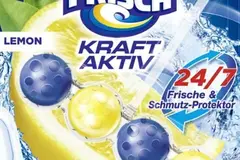Key takeaways
- LYB and Henkel developed a transparent plastic cage for toilet rim blocks using 30% recycled and 70% renewable-based polymers.
- The material uses LYB’s CirculenRenew monomers, derived from bio-based feedstocks.
- The partnership strengthens both companies’ commitments to reducing reliance on fossil-based virgin materials.

Lyondell Basell (LYB) has collaborated with Henkel to make a bio-based transparent plastic cage of Henkel’s WC Frisch/Bref solid toilet rim blocks.
The plastic cage was created using an injection molding process and incorporates 30% mechanically recycled plastics and 70% LYB CirculenRenew monomers.
Paula Sanabria Luque, senior director, marketing and commercial development, circular and low carbon solutions, EMEAI, at LYB, says: “We are proud to support Henkel with our bio-circular solution, CirculenRenew, helping them meet their emissions reduction targets along the value chain.”
“This builds on our long-standing collaboration in circularity, which has included several projects in mechanical recycling. Together with partners like Henkel, we are accelerating the availability of high-performance polymers — mechanically and chemically recycled and renewable-based — at scale through our comprehensive CirculenRenew portfolio.”
Bio-based feedstock
CirculenRenew polymers use a bio-based feedstock sourced from waste, such as residues from vegetable oil processing. According to LYB, the polymers offer the same high-performance as fossil-based alternatives but have lower CO2 emissions during production.
CirculenRenew PP offers a 44% lower product carbon footprint. It uses a mass balance approach with bio-circular feedstocks that do not compete with food production. The polymers are manufactured at LYB sites in Europe.
Carsten Bertram, head of packaging sustainability at Henkel Consumer Brands, says: “One part of our sustainability journey at Henkel is producing the packaging of our consumer products from more sustainable materials.”
“We are developing smart packaging solutions for reuse and recycling, reducing fossil-based virgin materials, and using more recycled plastic.”
Earlier this year, the LYB released the Pro-Fax EP649U, a PP impact copolymer for rigid food packaging. It features recycled and renewable content, resulting in thin-walled and lightweight containers.
In other developments, Henkel equipped Ravenwood Packaging with its hotmelt pressure-sensitive adhesives for Ravenwood’s linerless labelling system. Also, its personal care brand, Fa, updated its packaging materials, design, and ingredient formulations to include recycled materials, bright colors, and natural formulas.
In March, Henkel introduced phthalate-free PVC-based sealing compounds for metal packaging applications in industrial pails and drums.













